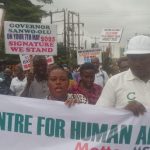
The Corporate Accountability and Public Participation Africa (CAPPA) has raised concerns that the current Sugar-Sweetened Beverage (SSB) tax in Nigeria is too low to have a significant impact on public health.
The Executive Director of CAPPA, Akinbode Oluwafemi, in his remarks at the special Media Round Table on Tuesday in Abuja, raised concerns that the current ₦10 per litre tax is “inadequate” and “fails to shift market behaviour or improve public health outcomes.”
The special media roundtable themed, “Time To Increase Sugary Drinks Tax Is Now”, was part of CAPPA’s broader advocacy to combat the rise of non-communicable diseases through effective fiscal policies, including strengthening the pro-health tax on Sugar-Sweetened Beverages (SSBs).
ALSO READ: NSDC removing impediments to sugar production in Nigeria — Bakrin
While speaking further, Akinbode, therefore demanded that the SSB tax should raise the final retail price of sugary drinks by 20 to 50 percent, in line with WHO recommendations.
He cited examples of countries like South Africa, Mexico, and the United Kingdom, which have implemented significant SSB taxes, resulting in reduced consumption and protected jobs.
The current tax rate amounts to barely 1% of the average retail price, which is at least ₦1,000 per litre of sugary drinks sold in the country. This is too minimal to influence consumer behaviour.
Non-communicable diseases (NCDs) now account for 1 in 3 deaths in Nigeria, according to the World Health Organisation (WHO). NCDs are no longer diseases of the rich or the elderly; they are aggressively decimating Nigeria’s workforce, destabilising families, and undermining national productivity.
A recent investigation revealed that Nigerians spend an estimated ₦1.92 trillion ($1.26 billion) annually on healthcare related to preventable conditions. Families are forced to sell land, liquidate lifelong savings, and descend into absolute poverty in desperate bids to save loved ones.
A well-designed and efficiently implemented SSB tax offers a low-cost, high-impact solution with broad benefits. It can reduce diet-related diseases, ease pressure on overstretched health systems, and generate much-needed domestic revenue.
The WHO has advised Nigeria and other member countries to raise the prices of alcohol and tobacco by 50 percent through taxation over the next 10 years to help curb rising NCDs.
Oluwafemi addressed common industry arguments against the SSB tax, including claims that it would harm the economy, lead to job losses, and lack transparency.
“The industry’s favourite horror story — that the tax will harm the economy and lead to job losses — is a scare tactic deployed in South Africa before they introduced their own SSB tax,” Oluwafemi said.
“Yet, the sector remained stable and jobs were protected. In fact, in countries where the SSB tax has been successfully implemented, beverage companies adapted by reformulating products, introducing healthier alternatives, and even expanding their market share.”
Oluwafemi urged the Nigerian government to prioritize public health over corporate profits.
“A stronger SSB tax will save lives, ease pressure on our fragile health system, and generate much-needed revenue,” he said.
“The time to act is now. Nigeria cannot afford the cost of delay. A stronger SSB tax will reduce the consumption of sugar-laden drinks, lower the incidence of preventable illnesses, and improve national health outcomes,” he added.
WATCH TOP VIDEOS FROM NIGERIAN TRIBUNE TV
- Let’s Talk About SELF-AWARENESS
- Is Your Confidence Mistaken for Pride? Let’s talk about it
- Is Etiquette About Perfection…Or Just Not Being Rude?
- Top Psychologist Reveal 3 Signs You’re Struggling With Imposter Syndrome
- Do You Pick Up Work-Related Calls at Midnight or Never? Let’s Talk About Boundaries






